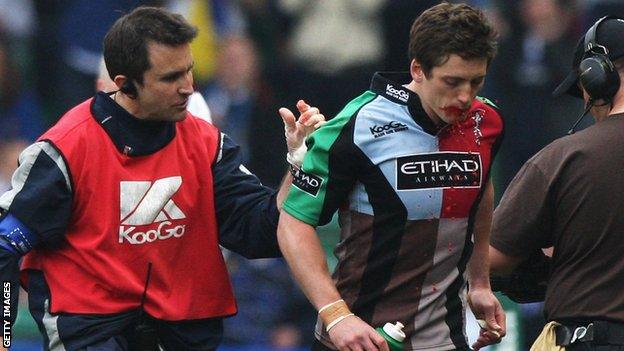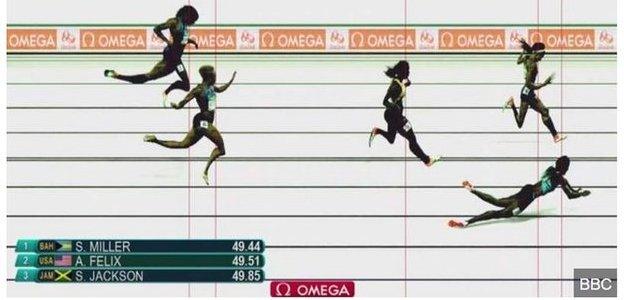Mankad run-outs, underarm serves: Which sort of unsporting behaviour is worst?
- Published
It's all fun and games until someone bends the rules.
Plenty of people are saying English cricketer Jos Buttler was entitled to be outraged when he was 'unfairly' run out backing up at the non-striker's end by Ravichandran Ashwin in an Indian Premier League match on Monday.
The dismissal - known as a 'Mankad' after India bowler Vinoo Mankad, who ran out Australia batsman Bill Brown in a similar manner in 1947 - is within the laws, but many feel it is not within the spirit of the game.
Does a football placed outside the corner-kick area get you raging? Does a Sergio Ramos deliberate yellow card send you apoplectic?
Here are a few more examples of the use of shady tactics in sport - have a read and rank your (least) favourite at the bottom of this page.
1. Tennis tactic that's a little underhand

Judy Murray says she is "surprised" no other players follow Nick Kyrgios' lead
Nick Kyrgios is well known for his rebellious attitude, and was living up to his reputation on Monday by serving underarm at the Miami Open.
There is nothing in the rules to say you have to serve over-arm (and let's face it, few of us mortals have nailed the manoeuvre anyway), but as a professional player it certainly is a cheeky move.
But Judy Murray has said it was "genius".
"The whole point of tennis competition is to disrupt your opponent's game by applying pressure through changing the speed, spin, direction, depth or height of the ball. And that includes the serve."
That may be true, but Kyrgios is not short of critics who think he doesn't always represent the sport well - including Rafael Nadal.
(Our unofficial view? Sport needs pantomime villains - ultimately harmless and keeps us wanting more. All hail Kyrgios - the king of the tennis bad boys.)
2. Quins trick that came back to bite them

Tom Williams was taken off the field to make way for Nick Evans in what became known as "Bloodgate"
We're used to diving in football, but this example took feigning injury to a new level - with added gore.
In April 2009 Leinster faced Harlequins in an incredibly tight Heineken Cup quarter-final.
Quins fly-half and goal-kicker Nick Evans had been substituted earlier in the match, but was allowed to return to the field as a 'blood replacement' for winger Tom Williams.
The first sign something was amiss was when TV cameras caught him winking towards the dugout.
It turned out Williams had been instructed to bite - Dracula-style - into a fake blood capsule to simulate an injury, allowing Evans to come back on in a tactical switch. (It didn't help - Leinster won 6-5 and went on to lift the Heineken Cup for the first time.)
Quins were fined £237,000 and director of rugby Dean Richards was banned for three years.
Pretty shocking tactics in professional sport - but how many of us considered it to get our siblings into trouble?
3. The edge of insanity

Australian players were up in arms about Broad not walking
For a sport that retains a fairly genteel image, cricket has had more than its fair share of controversy.
By convention, batsmen who know they have hit the ball will give themselves out if caught, though it's a convention that's been widely ignored for a long time.
But in a hugely contentious moment during the 2013 Ashes series, England's Stuart Broad was given an astonishing reprieve when umpire Aleem Dar failed to spot a particularly thick edge to Michael Clarke at slip off the bowling of Ashton Agar.
After the match, BBC cricket correspondent Jonathan Agnew said: "There is nothing within the laws of cricket that says he had to depart. But when he chose not to, it became an issue for the spirit of the game.
"If you decide to stay, you decide to accept the consequences. You must accept the questions of sportsmanship. You must accept all the abuse that comes your way."
And boy, did it come his way - during the following Ashes series down under, the Aussie press went to town on Broad.
One newspaper refused to mention his name, and simply referred to him as "a 27-year-old English medium pace bowler".
Ouch.
4. When the dip becomes a dive

The photo finish shows Shaunae Miller falling across the line and denying Allyson Felix
The women's 400m final at the Rio Olympics in 2016 provided one of the greatest photo finishes of all time.
Shaunae Miller of the Bahamas literally dived across the line as she edged out American world champion Allyson Felix to win the gold medal.
"The only thing I was thinking was the gold medal and the next thing I know I was on the ground," Miller said at the time. "It was just a reaction."
She added: "I've never done it before. I have cuts and bruises, a few burns."
The dive - although not always a good idea - was technically legal.
The official rules of athletics state: "The first athlete whose torso (as distinguished from the head, neck, arms, legs, hands or feet) reaches the vertical plane of the closest edge of the finish line is the winner."
But we defer to the legend that is Michael Johnson for the final verdict.

5. When time-wasting gets outsourced

Swansea ball boy Charlie Morgan explained he fell on top of the ball
Time-wasting in football is probably one of the most commonplace means of bending the rules, and referees are generally alive to it.
Trickier when the time-waster is not actually one of the players.
Eden Hazard was shown a red card and forced to apologise after he kicked at Swansea ball boy Charlie Morgan, who had, by his reckoning, fallen on top of the ball, during a League Cup tie between the Swans and Chelsea in 2013.
Then Blues boss Rafael Benitez said both player and ball boy apologised to each other.
"They both recognise there was a mistake. The boy was apologising for time-wasting. Hazard was frustrated and tried to get the ball. He was kicking the ball and getting the ball."
Charlie's Swans managed a 0-0 draw on the night to go through on aggregate to the final, where they beat Bradford City 5-0.
So which of these examples of unsportsmanlike behaviour is the worst, and which do you not mind as much?